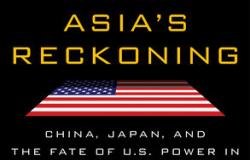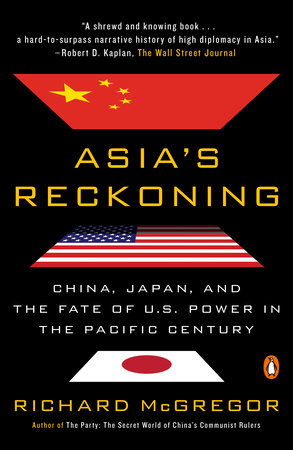Hollywood Meets Asia: A Review of McGregor’s Asia’s Reckoning

Richard McGregor’s Asia’s Reckoning: China, Japan and the Fate of US Power in the Pacific Century has, according to the numerous blurbs on the cover and comments on the Amazon, received an overwhelming public approval since it was published in 2017. The book deals with the triangular relationship between the United States, Japan and China since the Communist Revolution in China until the Trump administration. Other Asian countries do appear from time to time, but play a very small role in the overall narrative.
The book is good, and perhaps that’s why it has received so much acclaim, as a narrative of that relationship. It is also interestingly written and can be read in a couple of days. It has all the advantage of a good reportage. But it has all of its disadvantages as well, and in my view the latter are much more important.
McGregor’s recitation of events is singularly devoid of deeper historical and geopolitical understanding, or perhaps more accurately, the author is either uninterested or unable to do it. It is much inferior to many books on China and Asia that I have reviewed on my blog: Kissinger, Hung, Arrighi, Bickers, Jacques, Dasgupta. It is a useful book of references (when something happened) and of a blow-by-blow history (with some omissions) but otherwise it is unlikely to help you understand things.
There are three countries in the book. They are called the bad (China), the clueless (Japan) and the benevolent (the United States). The entire book, from page 1 to page 377 follows that script. Like a good Hollywood movie, the baddie is not always bad, nor is the benevolent always benevolent but most of the time they do play their assigned roles.
McGregor is the follower of a usual script for such dramas. The bad country has to have some obsession or belief (say, like Dr. No in the early James Bond movies) that is beyond rational understanding or discussion. In this case, it is China’s obsession with the Japanese invasion and Nanjing massacre. Every “normal” country, McGregor avers, should have by now gotten over it, but China because it is a bad country (ruled by a communist party) refuses to do so.
Japan is alternatively naïve and stubborn, hapless and self-interested. It apologizes and then its PMs visit the Yasukuni shrine again; then it trades with China, and later it fears China overtaking it technologically. The United States is a benevolent and just older brother who tries to make the two squabbling sides see some sense and attempts at all costs to avoid conflict and to preserve stability in East Asia.
McGregor would never tell you in so many words that this is the gist of his book—simply because thus told, it looks risibly like a caricature. But in reality it is.
The book never mentions that US benevolent post-War hegemonism in Asia was precisely done in order to lessen the communist (and thus Chinese) influence (see Arrighi, Jacques). The US opened its market for Japanese, Korean and Taiwanese exports and helped them build themselves into prosperous industrial nations so that they would be immune to communist propaganda. This was indeed a remarkable deed, but it was not motivated by some profound altruism, but by a well-understood self-interest, by Realpolitik.
Similarly, later, the US extended the same welcome to China. Here again it was motivated, as Kissinger in his masterful “On China” and many other publications writes, by the desire to turn China from a neutral position in the Soviet-American conflict to an American ally. (Brzezinski and Deng in 1979 jokingly, or mockingly, drank the vodka that the Soviet ambassador presented to Brzezinski in order to celebrate the new Sino-American alliance). That calculation was moreover sustained by economic interests that US business had in penetrating the Chinese market. Now, that strategy might have gone, at some point, awry as the US has undoubtedly helped create in a prosperous and rising China a serious contender to its global power—but the calculation was again steeped in national self-interest.
These simple facts are totally absent from McGregor’s book. Surely, in a 400-page long book, one could have dedicated say twenty pages to some reflections. But that seemed unnecessary to McGregor.
His criticism of Chinese “obsession” with Japanese war guilt is similarly unreflexive. I am of the opinion that the statute of limitation on World War II guilt has expired, but I do notice that this is far from being true and that China is also far from being unique in it. Israel is unlikely to put the Holocaust between brackets any time soon. Poland is mulling asking Germany (with whom it is in the European Union) to pay war reparations. It is impossible to understand the 1991-99 Balkan wars without reference to the genocides that took place during the World War II. The debate on who collaborated with the Nazis and when is very alive in the Russian-Ukrainian conflict. One could go on.
So China’s insistence on the importance of the World War II is not singular. In order to render it so, McGregor highlights the fact that it was much less of an issue under Mao than later. But this is not surprising at all. Mao, like all communists, emphasized the ideological, not national, part of the war. He put together as “fascists” the imperial Japan and KMT. That reduced the national responsibility of the Japanese as such and transfered it more widely to the “enemies of the people”, whether Japanese or Chinese.
I went to an elementary school in communist Yugoslavia. Yugoslavia’s World War II experience was very similar to China’s. A powerful country (Nazi Germany) brutally attacked it; it was helped in this attack by all other neighboring countries and by the “domestic traitors”. Only communist fought against everybody. In the reading of history that we got in school, the German people qua people were implicitly absolved: it was the German upper classes that created and benefited from Fascism, and found a willing ally in various domestic reactionaries. (It was the same script as taught/believed in East Germany.) This history is uncannily similar to China’s except that KMT did fight the Japanese unlike the domestic collaborators in Yugoslavia. But Mao was hardly likely to advertise that.
Thus, the fact that the Maoist China raised the “remorse” and “apology” much less frequently than the post-Dengist China is indeed explained by ideology. But McGregor is reluctant to accept this simple explanation because it would place him in the same camp as Mao. So he prefers to believe that the fact that the Nanjing massacre became much greater issue with passage of time indicates some uniquely Chinese villainy or perfidy.
McGregor could have also wondered why the Holocaust was much less present in worldwide conscience in the 1950s than it is today. It is an utterly simplistic view that the political importance and social consciousness of committed crimes lessens with time. It more likely follows an inverted U-shape, becoming eventually irrelevant but not without reaching a peak at some point rather far in time from the original crime.
McGregor is one of the “narratores rerum” (Cicero; not in a laudatory way) who would give you the dates on when certain things happened, and interesting short life histories of the principals but little else. If you are yearning for some real understanding you have to look elsewhere.
This first appeared on Branko's blog and was reposted with permission.



